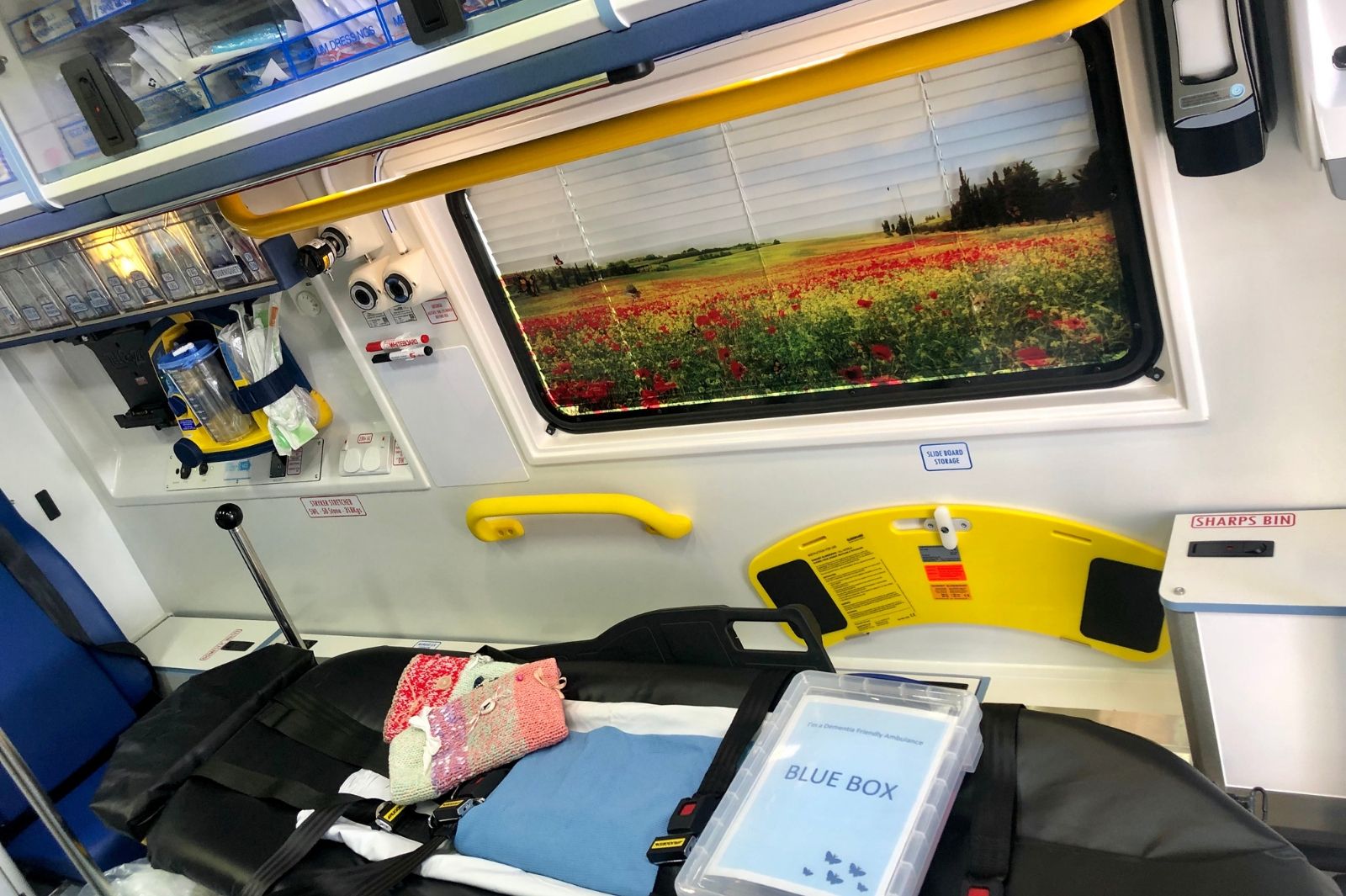First ever dementia friendly ambulance design signals better care for patients
Date 3.09.2019

People with dementia in the region who call for an ambulance will benefit from an emergency vehicle tailored toward giving them better care, the first of its kind in the UK.
Earlier this year, East Midlands Ambulance Service (EMAS) invited guests and staff from the University of Northampton’s dementia centre UnityDEM to board an ambulance and give their feedback about it.
EMAS have used these comments and taken four fully working ambulances and updated them to make people with dementia feel less frightened or confused and include tools to help staff better communicate and treat them. The additions include:
- The window nearest the ambulance stretcher – is now covered with a scene that contains key points to talk and reminisce about, including children playing to remind people of their youth and animals for patients to guess what they are. The original window was very reflective, which feedback from the group showed can be confusing
- Music provision – a USB device provided with music in specific decades to allow staff to choose tracks that patients are most likely to have positive reactions/memories to
- ‘Twiddlemuffs’ – a knitted hand muff, decorated with internal and external items, such as buttons and ribbons. This helps reduce anxiety in patients with dementia and reduce the likelihood of them reaching out or unstrapping their safety belts therefore increasing their safety by giving them something to keep their hands busy during an ambulance ride
- This is Me documents – these include information such as what people like to be called, where they grew up, how they take their medication, things they don’t like and can be completed at home by patients and their carers for paramedic crews to refer to during future emergency call outs
- Communication guide for staff – dementia friendly training for mall front-line EMAS staff was rolled out from April this year; this guide contains top tips on using the changes in the ambulance to prompt conversations, how to alter their communication style to meet the needs of the patient and things to keep in mind for any patients who may not be able to communicate verbally.
The ambulances will start service on Monday 9 September in Northamptonshire and Leicestershire and EMAS have plans for all 104 of their ambulances across the two counties to be dementia friendly by the end of October.
In the UK there are over 850,000 people diagnosed with dementia.
In Northamptonshire alone, it is expected that 12,000 people will be living with a diagnosis of dementia by 2025. EMAS responds to emergency calls from 43,000 patients a year who are living with a diagnosis of dementia. Over 5,000 of these patients live in Northamptonshire.
The University of Northampton’s dementia research centre (NDRIC) has been at the forefront of several projects and pieces of research to help make the town more ‘dementia friendly’. That is, to make people more aware of and better able to respond to, the needs of those with dementia and their carers.
Professor Jacqui Parkes, the University’s NDRIC lead, said: “Sometimes, it’s not just the big things that make a difference in people’s lives, but more subtle adjustments and tweaks can cumulatively, make a big impact.
“For people with dementia, going into an ambulance can be a sudden, strange and potentially frightening experience, but EMAS have shown with their dementia friendly ambulance – the first of its kind in the UK – that with little adjustments, this can be reduced and lead to a much more positive experience. We look forward to seeing the full fleet in action very soon.”
Charlotte Walker, Ambulance Operations Manager for EMAS, added: “We know that a journey in an ambulance can be a frightening and worrying time for the majority of patients, and this can be even more heightened in patients with dementia.
“This exciting project is aligned to EMAS’ vision and values known as ‘The Big 3: Respond, Develop and Collaborate’.
“The assistance of the University of Northampton and UnityDEM in developing these changes has truly demonstrated how collaborative working ensures patients are kept at the centre of all we do.
“Continuously developing our service to meet the specific needs of our patients is vital and enables the response patients receive across the East Midlands to be of the highest possible standard.”
Find out more about the University’s dementia research centre.